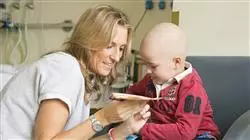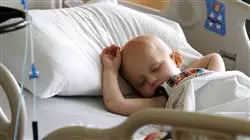University certificate
The world's largest faculty of medicine”
Introduction to the Program
Improve your knowledge through this program, where you will find the best didactic material with real clinical cases. Learn here about the latest advances in the specialty to be able to perform a quality medical practice"

Infectiology is constantly undergoing changes. At the epidemiological level, with the emergence or re-emergence of certain diseases that are unknown or have little practice (zika, chikungunya, hemorrhagic fevers, among others), others that have fallen into oblivion or are unknown to younger physicians such as diphtheria, measles, whooping cough or flaccid paralysis associated with the polio vaccine virus.
At the therapeutic level, the emergence of resistance (BLEES, MRSA, carbapenem-resistant enterobacteria, etc.), often caused by our unwise and rational use of drugs, creates problems for the clinician when it comes to initial empirical treatment in certain situations.
At the diagnostic level, the increasingly frequent availability of new techniques allows a more rapid etiological diagnosis or by complementary techniques that require clinical diagnostic orientation such as ultrasound, computed tomography or magnetic resonance imaging. Without forgetting the support that the clinician has in laboratory tests that determine acute phase reactants such as procalcitonin or C-reactive protein, which are sometimes given excessive importance, forgetting that we treat patients and not laboratory results.
All this means that, in order to attend these patients with the maximum guarantee, the clinician must maintain a continuous training, even if they are not a specialist, since, as we have mentioned, the percentage of visits or interconsultations related to the infection is very high. If we add to this the increasing amount of information provided by parents, sometimes not always contrasted, professional updating becomes essential to be able to provide adequate information according to the current scientific evidence at all times.
Update your knowledge through the Postgraduate certificate in Infections in Children with Immunodeficiencies or Other Deficits in a practical way and adapted to your needs"
This Postgraduate certificate in Infections in Children with Immunodeficiencies or Other Deficits contains the most complete and up-to-date scientific program on the market. The most important features of the course are:
- Clinical cases presented by experts in infectology. The graphic, schematic, and eminently practical contents with which they are created provide scientific and practical information on the disciplines that are essential for professional practice
- Diagnostic and Therapeutic Novelties on Infections in Children with Immunodeficiencies or Other Deficiencies
- Algorithm-based interactive learning system for decision-making in the presented clinical situations
- With a special emphasis on evidence-based medicine and research methodologies in Infection in Children with Immunodeficiencies or Other Deficits
- All of this will be complemented by theoretical lessons, questions to the expert, debate forums on controversial topics, and individual reflection assignments
- Content that is accessible from any fixed or portable device with an Internet connection
This Postgraduate certificate may be the best investment you can make in the selection of an up-to-date program for two reasons: in addition to updating your knowledge in Infections in Infections in Children with Immunodeficiencies or Other Deficits you will obtain a certificate issued by TECH Global University"
Forming part of the teaching staff is a group of professionals in the world of Pediatric Infectology, who bring to this course their work experience, as well as a group of renowned specialists, recognised by esteemed scientific communities.
The multimedia content developed with the latest educational technology will provide the professional with situated and contextual learning, i.e., a simulated environment that will provide immersive training program to train in real situations.
This program is designed around Problem Based Learning, whereby the student must try to solve the different professional practice situations that arise during the course. For this reason, you will be assisted by an innovative, interactive video system created by recognized experts in the field of infectious diseases and with great teaching experience.
The Postgraduate certificate includes real clinical cases and exercises to bring the development of the Postgraduate Certificate closer to the Clinical Doctor´s practice"

Take the opportunity to update your knowledge in Pediatric Infectious Diseases and improve your patient care"
Why study at TECH?
TECH is the world’s largest online university. With an impressive catalog of more than 14,000 university programs available in 11 languages, it is positioned as a leader in employability, with a 99% job placement rate. In addition, it relies on an enormous faculty of more than 6,000 professors of the highest international renown.

Study at the world's largest online university and guarantee your professional success. The future starts at TECH”
The world’s best online university according to FORBES
The prestigious Forbes magazine, specialized in business and finance, has highlighted TECH as “the world's best online university” This is what they have recently stated in an article in their digital edition in which they echo the success story of this institution, “thanks to the academic offer it provides, the selection of its teaching staff, and an innovative learning method aimed at educating the professionals of the future”
A revolutionary study method, a cutting-edge faculty and a practical focus: the key to TECH's success.
The most complete study plans on the university scene
TECH offers the most complete study plans on the university scene, with syllabuses that cover fundamental concepts and, at the same time, the main scientific advances in their specific scientific areas. In addition, these programs are continuously being updated to guarantee students the academic vanguard and the most in-demand professional skills. In this way, the university's qualifications provide its graduates with a significant advantage to propel their careers to success.
TECH offers the most comprehensive and intensive study plans on the current university scene.
A world-class teaching staff
TECH's teaching staff is made up of more than 6,000 professors with the highest international recognition. Professors, researchers and top executives of multinational companies, including Isaiah Covington, performance coach of the Boston Celtics; Magda Romanska, principal investigator at Harvard MetaLAB; Ignacio Wistumba, chairman of the department of translational molecular pathology at MD Anderson Cancer Center; and D.W. Pine, creative director of TIME magazine, among others.
Internationally renowned experts, specialized in different branches of Health, Technology, Communication and Business, form part of the TECH faculty.
A unique learning method
TECH is the first university to use Relearning in all its programs. It is the best online learning methodology, accredited with international teaching quality certifications, provided by prestigious educational agencies. In addition, this disruptive educational model is complemented with the “Case Method”, thereby setting up a unique online teaching strategy. Innovative teaching resources are also implemented, including detailed videos, infographics and interactive summaries.
TECH combines Relearning and the Case Method in all its university programs to guarantee excellent theoretical and practical learning, studying whenever and wherever you want.
The world's largest online university
TECH is the world’s largest online university. We are the largest educational institution, with the best and widest online educational catalog, one hundred percent online and covering the vast majority of areas of knowledge. We offer a large selection of our own degrees and accredited online undergraduate and postgraduate degrees. In total, more than 14,000 university degrees, in eleven different languages, make us the largest educational largest in the world.
TECH has the world's most extensive catalog of academic and official programs, available in more than 11 languages.
Google Premier Partner
The American technology giant has awarded TECH the Google Google Premier Partner badge. This award, which is only available to 3% of the world's companies, highlights the efficient, flexible and tailored experience that this university provides to students. The recognition as a Google Premier Partner not only accredits the maximum rigor, performance and investment in TECH's digital infrastructures, but also places this university as one of the world's leading technology companies.
Google has positioned TECH in the top 3% of the world's most important technology companies by awarding it its Google Premier Partner badge.
The official online university of the NBA
TECH is the official online university of the NBA. Thanks to our agreement with the biggest league in basketball, we offer our students exclusive university programs, as well as a wide variety of educational resources focused on the business of the league and other areas of the sports industry. Each program is made up of a uniquely designed syllabus and features exceptional guest hosts: professionals with a distinguished sports background who will offer their expertise on the most relevant topics.
TECH has been selected by the NBA, the world's top basketball league, as its official online university.
The top-rated university by its students
Students have positioned TECH as the world's top-rated university on the main review websites, with a highest rating of 4.9 out of 5, obtained from more than 1,000 reviews. These results consolidate TECH as the benchmark university institution at an international level, reflecting the excellence and positive impact of its educational model.” reflecting the excellence and positive impact of its educational model.”
TECH is the world’s top-rated university by its students.
Leaders in employability
TECH has managed to become the leading university in employability. 99% of its students obtain jobs in the academic field they have studied, within one year of completing any of the university's programs. A similar number achieve immediate career enhancement. All this thanks to a study methodology that bases its effectiveness on the acquisition of practical skills, which are absolutely necessary for professional development.
99% of TECH graduates find a job within a year of completing their studies.
Postgraduate Certificate in Infections in children with immunodeficiencies or other deficiencies.
Infectious Diseases is a field in constant change, which is a huge challenge for specialists. In epidemiological terms, new diseases are appearing or others that were previously unknown or uncommon are reappearing, such as Chikungunya fever, Zika and several hemorrhagic diseases. In addition, there are other pathologies that were previously considered to be under control, such as Diphtheria, Measles, Pertussis and Poliomyelitis, which are re-emerging and require special attention from physicians. In terms of therapy, the emergence of bacterial resistances such as BLEES, MRSA and Carbapenem resistant Enterobacteriaceae are becoming more and more frequent and are postulated as an obvious concern. This is why an academic opportunity as valuable for specialists as this Postgraduate Certificate in Infections in Children with Immunodeficiencies or other deficiencies is so urgent.
It is the only Postgraduate Certificate in the market on infections with Immunodeficiencies in Pediatrics.
This Postgraduate Certificate in Infections in the child with Immunodeficiencies or other deficiencies will allow you to develop a strategy in Pediatrics to deal with the suspicion of an infection associated with a Primary Immunodeficiency. Similarly, you will be able to act more effectively against vertically transmitted HIV infection in adolescents, among other pathologies. All this and more in an academic course condensed in 225 hours in which you will quickly deepen in all the concepts thanks to its reiteration directed in the most dynamic academic resources. This process is known as Relearning and is being promoted by TECH at an international level.







